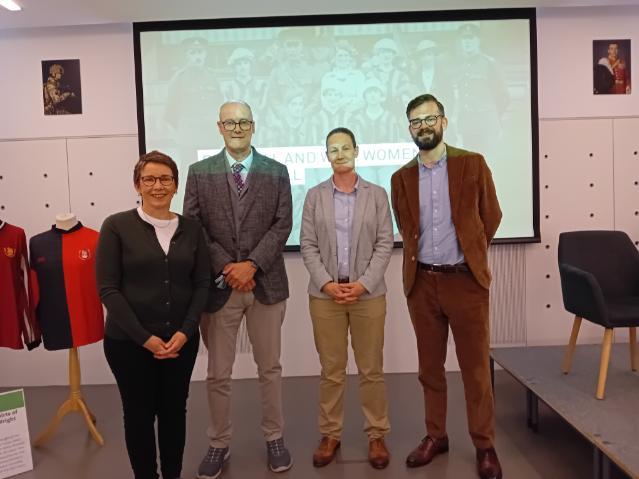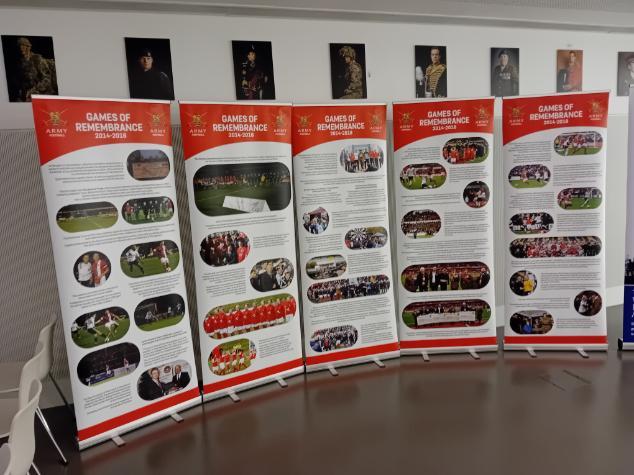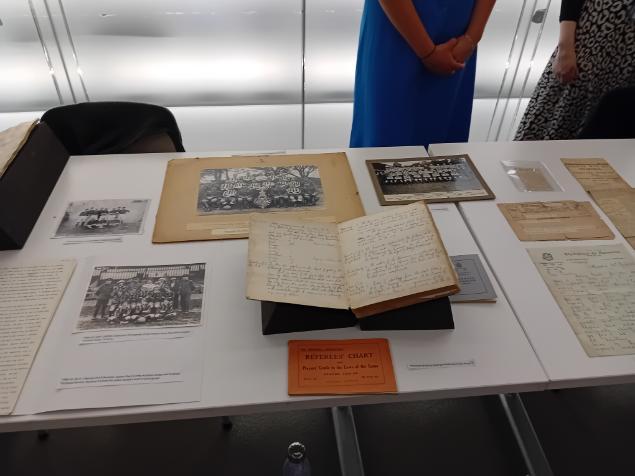Football and War: Women in Football from World War One to Contemporary Times
24/06/2024 - 6.01
Alex Alexandrou
As part of its History Heritage Project, the Army FA in partnership with the National Army Museum, Western Front Association and the Football and War Network has organised a series of public events that will cover various aspects of football during the First World War and contextualizing them from a contemporary perspective. On the 22nd May, the first of these events took place at the National Army Museum entitled – Football and War: Women in Football.
The panel of experts assembled for the event were:
Steve Bolton, a leading women’s football historian whose expertise and passion centres on women’s football during and after the First World War and is credited as a producer for the short film Granny, about his international footballing grandmother, Lizzy Ashcroft.
Acclaimed playwright, Amanda Whittington, whose numerous plays for stage and radio include two plays that have women’s football during the First World War as key themes, the first of which is Atalanta Forever and more recently, The Invincibles, which set against England’s progress in the 2023 Women’s World Cup against the rise and fall of the extraordinary women’s First World War football team - Sterling Ladies.
Captain Krissy Wright of the Adjutant General's Corps, who has been involved in Army Football at all levels for over 25 years, making her debut for the Army Representative Women's team in 1999 and is currently player manager of the AGC team.
The panel was hosted by Daniel Cowling, a historian at the National Army Museum with a particular interest is in modern British and European history. His first book, Don’t Let’s Be Beastly to the Germans, was published in 2023.

The Panel - Left to Right: Amanda Whittington, Steve Bolton, Krissy Wright and Daniel Cowling. Source: Author's Collection
All three experts made significant contributions that educated and enlightened the diverse and significant audience, who had braved the inclement weather and the Chelsea Flower Show to attend.
Steve Bolton kicked off proceedings with a screening of Granny, that led to him discussing his grandmother’s career (which she kept hidden from her family!) that included playing for St Helens and Dick Kerr ladies, linking it to the rise of women’s football during the First World War and the years following the conflict. He highlighted the impact women’s football had in terms of social change for women in relation to their war work and recreational activities, using the undefeated Sterling Ladies as a case study in point. Steve explained how significant crowds turned up to watch women’s matches that raised incredible amounts of money for war and post-war charities as well as being great public morale boosters. Steve also discussed the 1902 and 1921 FA bans on women’s football and the short and long-term impact they had.
Amanda spoke about her inspiration for her two football-related plays, Atalanta Forever and The Invincibles in terms of being a record of social change (albeit short-lived) for women during those tumultuous times, as well as examining the ethical issues underpinning them. She went on to explain how and why she used the two contrasting stories of the Sterling Ladies team from the First World War and the mother and daughter relationship of the characters Maya and Sammy that are intertwined with the exploits of The Lionesses during the 2023 Women’s World Cup, creating a fascinating juxtaposition of experiences between these women of two very different and distinct eras. Poignantly, Amanda spoke about her all too brief footballing playing days, highlighting how even during her formative years, in what could be termed more enlightened times, girls playing football was frowned upon. Hence, her determination through her plays and involvement in girls and women’s football to redress the balance.
Krissy Wright, a legend of Army Women’s football (even though she is too modest to accept this moniker) spoke about her illustrious and ongoing Army football career which now spans over 25 years. Krissy who comes from a military family and whose parents actively encouraged her to play football and other sports, spoke about how she joined the Army for a career, that has seen her advance through the ranks and deployed around the world, including conflict zones and not to play football. However, as she explained, she was presented with a footballing pathway that included playing at Corp, Army Representative and UK Armed Forces Representative level, that has seen her win multiple trophies and inter-services tournaments, represent the Army Representative Women’s team over 100 times, go on footballing tours to countries such as Australia and Brazil, as well as now being player manager of the AGC team. Krissy highlighted how Army Women’s football has changed and evolved during her time. This has included seeing a greater equalisation between the Men’s and Women’s Army Representative teams in terms of kit, equipment and location of matches.
The event was further enhanced with an exhibition of firstly, artefacts from the Army FA collection that has now been placed with the National Army Museum, along with set of banners telling the story of the Army FA, particularly how Army Women’s football has evolved. Secondly, a selection of artefacts and memorabilia from Steve Bolton’s personal collection that tell fascinating stories of the early days of women’s football.


The Exhibition - Telling the Story of Women's Football During World War One and the History of the Army FA. Source: Author's Collection
The next event in the series will take place on the 11th July and is entitled - Football and War: The First World War, with the panel of experts being made up of Carrie Dunn, Clive Harris and Alex Jackson. Find out more and book a ticket at - https://www.nam.ac.uk/whats-on/football-and-war-first-world-war
Biography
Alex Alexandrou is the Co-founder and Chair of the Football and War Network


/prod01/wlvacuk/media/departments/digital-content-and-communications/images-2024/240624-Alumni-Awards-2024-Resized.jpg)
/prod01/wlvacuk/media/departments/digital-content-and-communications/images-18-19/220325-Engineers_teach_thumbail.jpg)
/prod01/wlvacuk/media/departments/digital-content-and-communications/images-2024/240627-UN-Speaker-Resized.jpg)
/prod01/wlvacuk/media/departments/digital-content-and-communications/images-2024/240320-Uzbekistan-Resized.jpg)
/prod01/wlvacuk/media/departments/digital-content-and-communications/images-2024/240229-The-Link-Resized.jpg)
/prod01/wlvacuk/media/departments/digital-content-and-communications/images-2024/240627-Lady-Aruna-Building-Naming-Resized.jpg)